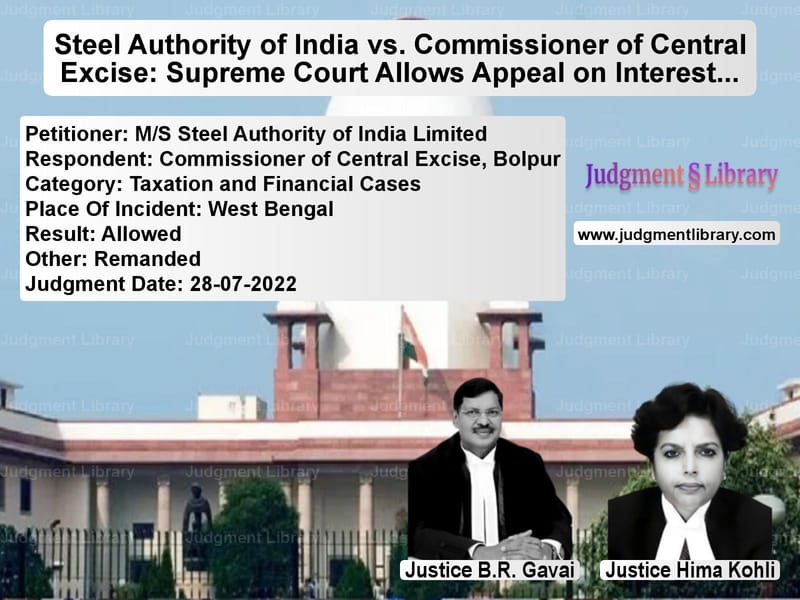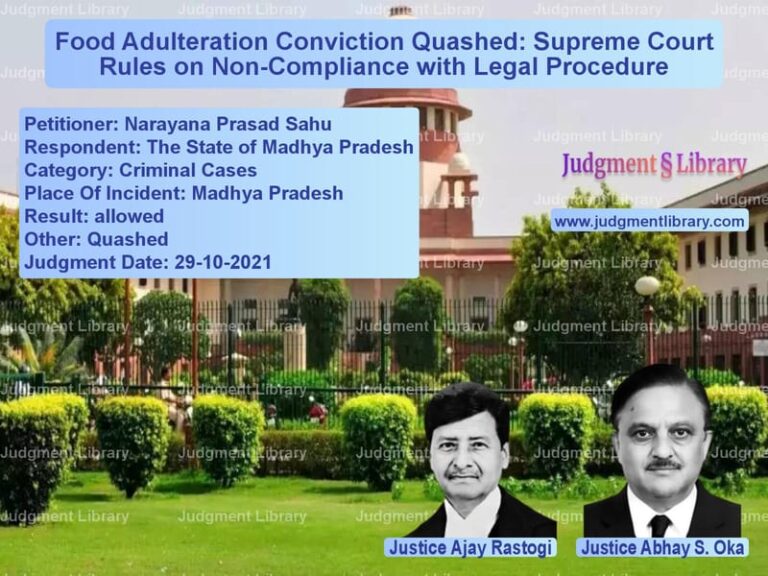Steel Authority of India vs. Commissioner of Central Excise: Supreme Court Allows Appeal on Interest Issue
The case of M/S Steel Authority of India Limited vs. Commissioner of Central Excise, Bolpur revolved around the issue of excise duty demands and whether the appellant, a Public Sector Undertaking (PSU), was liable to pay interest on the duty amount. The Supreme Court overturned the Calcutta High Court’s decision and remitted the matter to the Customs, Excise, and Service Tax Appellate Tribunal (CESTAT) for reconsideration of the interest aspect.
This ruling clarifies the legal framework surrounding PSUs’ liability in tax matters and highlights the evolving jurisprudence on government litigation clearance procedures.
Background of the Case
The dispute originated from a show-cause notice issued by the Commissioner of Central Excise, demanding a duty payment of Rs. 15.66 crores for clearances made between July 2000 and December 2004. The demand was issued under the extended period of limitation, alleging non-compliance with excise duty obligations.
The appellant, being a PSU, had to obtain clearance from the Committee of Disputes (CoD) before pursuing litigation. The CoD, in a meeting on November 2, 2006, allowed the appellant to challenge only the penalty aspect of the demand while holding that the duty aspect was revenue-neutral under the CENVAT regime.
Following this, the appellant approached CESTAT, which ruled in its favor on the penalty issue but dismissed the duty demand challenge as non-maintainable due to lack of CoD clearance.
Key Legal Issues
- Was the appellant liable to pay interest on the duty amount?
- Did the absence of CoD clearance bar the appellant from contesting the duty demand?
- Did the appellant’s deposit of Rs. 15.66 crores under protest affect its legal rights?
- Should the Supreme Court remand the case to CESTAT for fresh consideration?
Arguments Presented
Petitioner’s (Steel Authority of India Limited) Arguments:
- The CoD only allowed the company to challenge the penalty aspect, not the duty demand, which created an unfair limitation on its legal rights.
- The company paid the duty amount under protest following repeated directions from the authorities.
- The issue of whether interest was payable on the duty amount had never been adjudicated by any authority.
- Since the CoD mechanism was abolished by the Supreme Court in Electronics Corporation of India Limited vs. Union of India (2011), the company should now be allowed to contest the interest liability.
Respondent’s (Commissioner of Central Excise, Bolpur) Arguments:
- The appellant had already sought a refund of the duty amount, which was denied and had attained finality.
- Allowing the appellant to raise the interest issue at this stage would amount to reopening settled matters.
- The company’s failure to challenge the duty demand in the first place should bar it from contesting the interest liability.
Supreme Court’s Observations and Ruling
The Supreme Court ruled in favor of the appellant, setting aside the Calcutta High Court’s decision and remanding the case to CESTAT for reconsideration. Key observations include:
- The abolition of the CoD mechanism meant that the appellant should not be restricted from contesting the interest issue.
- The fact that the company paid Rs. 15.66 crores under protest indicated that it had not voluntarily accepted the duty demand.
- The CoD’s earlier decision did not address the question of interest liability.
- CESTAT must now examine the interest issue afresh and determine whether the appellant was liable to pay interest on the duty amount.
The Supreme Court held:
“In view of the abolition of the CoD mechanism and the fact that interest liability has not been adjudicated by any authority, the matter deserves reconsideration by CESTAT.”
The Court quashed the Calcutta High Court’s decision and directed CESTAT to decide the issue on its merits.
Key Takeaways from the Judgment
- PSUs can now contest tax demands even if they were earlier restricted due to CoD clearance requirements.
- Courts must consider whether payments made under protest affect the liability for interest.
- The abolition of the CoD mechanism has significant implications for pending and future litigation involving government entities.
- Tax authorities must ensure that interest liabilities are explicitly adjudicated before enforcing demands.
Impact of the Judgment
- This ruling provides clarity on how courts should handle cases where PSUs were previously restricted from litigation due to CoD regulations.
- It reinforces the principle that tax disputes must be adjudicated on their merits, even if procedural barriers existed earlier.
- The decision is likely to influence future cases involving interest liabilities on tax payments made under protest.
- Government entities may now revisit cases where CoD clearance was a factor in litigation outcomes.
Conclusion
The Supreme Court’s decision in this case ensures fairness in tax litigation by allowing PSUs to contest claims that were previously barred due to procedural mechanisms like the CoD. By remanding the interest issue to CESTAT, the Court reaffirmed that legal disputes must be resolved based on substantive merits rather than procedural technicalities.
This ruling will serve as a guiding precedent for similar cases, ensuring that tax authorities and businesses alike follow due process in matters of excise duty, interest liability, and procedural fairness.
Petitioner Name: M/S Steel Authority of India Limited.Respondent Name: Commissioner of Central Excise, Bolpur.Judgment By: Justice B.R. Gavai, Justice Hima Kohli.Place Of Incident: West Bengal.Judgment Date: 28-07-2022.
Don’t miss out on the full details! Download the complete judgment in PDF format below and gain valuable insights instantly!
Download Judgment: ms-steel-authority-vs-commissioner-of-cent-supreme-court-of-india-judgment-dated-28-07-2022.pdf
Directly Download Judgment: Directly download this Judgment
See all petitions in Income Tax Disputes
See all petitions in Tax Refund Disputes
See all petitions in Banking Regulations
See all petitions in Judgment by B R Gavai
See all petitions in Judgment by Hima Kohli
See all petitions in allowed
See all petitions in Remanded
See all petitions in supreme court of India judgments July 2022
See all petitions in 2022 judgments
See all posts in Taxation and Financial Cases Category
See all allowed petitions in Taxation and Financial Cases Category
See all Dismissed petitions in Taxation and Financial Cases Category
See all partially allowed petitions in Taxation and Financial Cases Category







